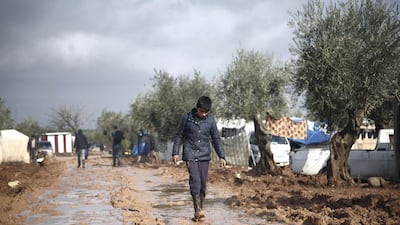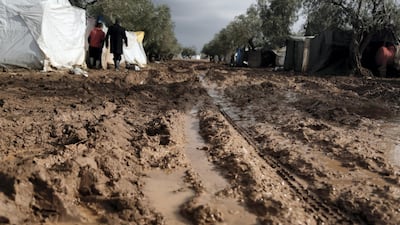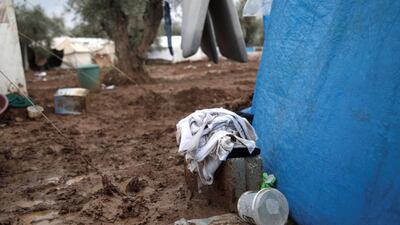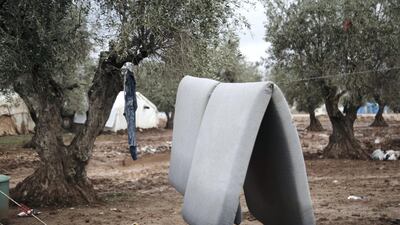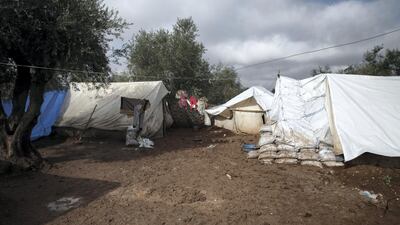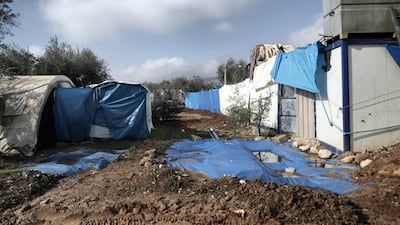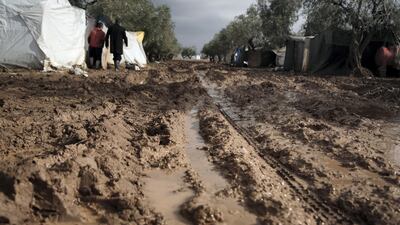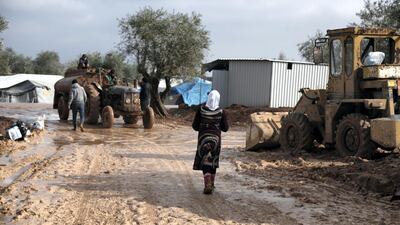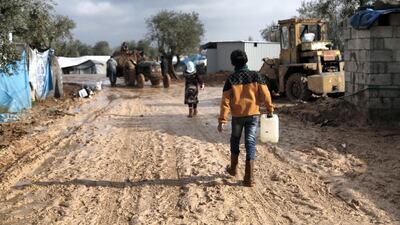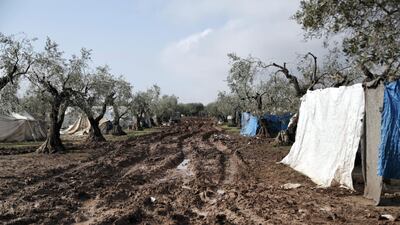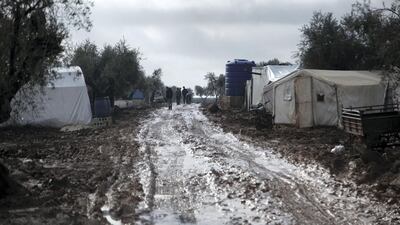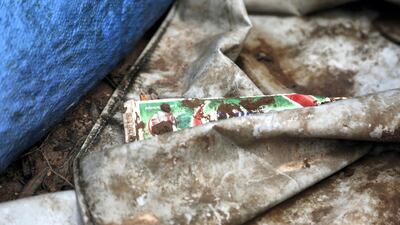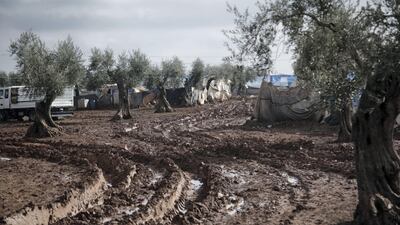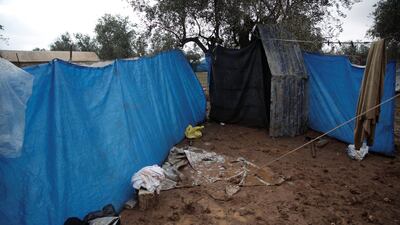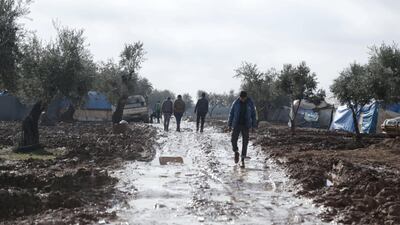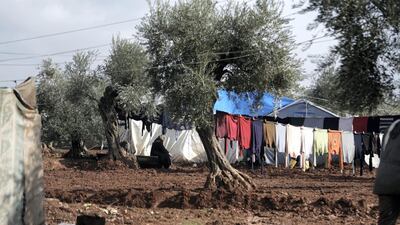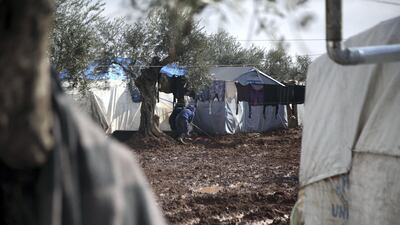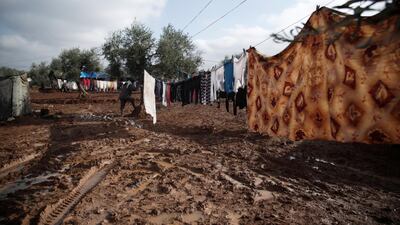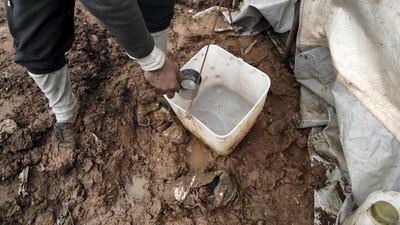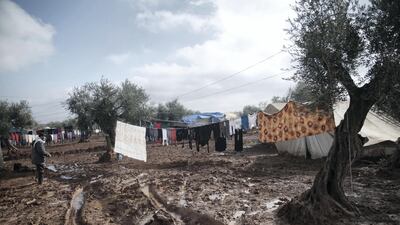As flood waters in northern Syria begin to retreat, hundreds living in displacement camps battle through knee-high mud to assess the damage to their tents and begin to pick up the pieces of their shattered lives.
Earlier this week, heavy rain washed out displacement camps across Idlib province, leaving at least one woman and her child dead.
“Idlib’s northern Syrian camps are drowning in rainwater and mud that has turned thousands of shelters from Jisr Al Shoughour to Atma near the Turkish border into disaster areas,” said Kamal Al Hasan, an aid worker with relief NGO Organisation Violet in rural Aleppo.
When a mortar attack levelled her home in Khan Sheikhoun in southern Idlib, Jamila Kafore moved to a tented settlement for displaced people. Jamila, whose husband was killed in the war, described how water leaked through the roof of their tent while she and her children were sheltering from the rain-soaked night.
“The rain was falling heavily on Saturday, it was like an open tap. For full day and night,” she said. “While we were removing water for two hours constantly during that freezing night, we had the tent falling on us after the rain and wind got aggressive.
“A pile of mud, that is what has been left to me,” she said.
“Why did we run away from bombing and end up like this, why is this is not coming to an end?” Jamila asked. “I don't mind living in a devastated house instead of living in a fragile plastic box that can’t stand blows,” she said, but added that the bombardments that forced them to flee had not stopped for them to return home.
Fourteen camps for internally displaced people in Idlib governorate have been impacted by the flooding, affecting around 40,000 people, blocking roads and closing schools and hospitals, the World Food Programme's Syria spokeswoman Marwa Awad told The National.
“Aleppo governorate, which also hosts a significant number of IDPs, was also affected with tents destroyed in several camps. A hospital in rural Aleppo was also shut down due to the flooding. Some 40 villages were also reportedly flooded in Qamishli city in Al Hassakeh governorate,” she said.
The UN is distributing food and supplies and has deployed heavy machinery to dig water channels and dykes to clear floodwater and stop more areas being affected.
“Should rains continue, there are concerns that dams could be at risk of flooding,” Ms Awad said.
Mohammad Hallajh, the director of local NGO Response Coordination Group, said that although this is not the first time heavy rain had washed out camps in the area, recent fighting and shelling had displaced a large number of people. This meant that the numbers living in the camps has been swelling in recent weeks.
Ayman, who is living in Bair-Balot displacement camp in south-eastern Idlib, said that there were now four or five families per tent.
The 31-year-old father of three said: “My three children got badly ill with a high temperature and stomach ache and one has been vomiting blood as a result of the critical cold he got during the nightmare we had yesterday’s night.”
He says the family have lost everything – clothes, bedding and belongings. “Even my phone was lost in the thick mud,” he said.
“We are tired of this, if we plead for the end to all of this brutal war and humiliation, who would listen and stop everything to let us go back to our homes safely? Probably no one.”
CREW
%3Cp%3E%3Cstrong%3EDirector%3A%20%3C%2Fstrong%3ERajesh%20A%20Krishnan%3C%2Fp%3E%0A%3Cp%3E%3Cstrong%3EStarring%3A%20%3C%2Fstrong%3ETabu%2C%20Kareena%20Kapoor%20Khan%2C%20Kriti%20Sanon%26nbsp%3B%3C%2Fp%3E%0A%3Cp%3E%3Cstrong%3ERating%3A%3C%2Fstrong%3E%203.5%2F5%3C%2Fp%3E%0A
More from Rashmee Roshan Lall
The%20specs
%3Cp%3E%3Cstrong%3EEngine%3A%3C%2Fstrong%3E%20Twin%20electric%20motors%20and%20105kWh%20battery%20pack%0D%3Cbr%3E%3Cstrong%3EPower%3A%20%3C%2Fstrong%3E619hp%0D%3Cbr%3E%3Cstrong%3ETorque%3A%20%3C%2Fstrong%3E1%2C015Nm%0D%3Cbr%3E%3Cstrong%3ETransmission%3A%20%3C%2Fstrong%3ESingle-speed%20auto%0D%3Cbr%3E%3Cstrong%3ETouring%20range%3A%20%3C%2Fstrong%3EUp%20to%20561km%0D%3Cbr%3E%3Cstrong%3EOn%20sale%3A%20%3C%2Fstrong%3EQ3%20or%20Q4%202022%0D%3Cbr%3E%3Cstrong%3EPrice%3A%20%3C%2Fstrong%3EFrom%20Dh635%2C000%3C%2Fp%3E%0A
Ten tax points to be aware of in 2026
1. Domestic VAT refund amendments: request your refund within five years
If a business does not apply for the refund on time, they lose their credit.
2. E-invoicing in the UAE
Businesses should continue preparing for the implementation of e-invoicing in the UAE, with 2026 a preparation and transition period ahead of phased mandatory adoption.
3. More tax audits
Tax authorities are increasingly using data already available across multiple filings to identify audit risks.
4. More beneficial VAT and excise tax penalty regime
Tax disputes are expected to become more frequent and more structured, with clearer administrative objection and appeal processes. The UAE has adopted a new penalty regime for VAT and excise disputes, which now mirrors the penalty regime for corporate tax.
5. Greater emphasis on statutory audit
There is a greater need for the accuracy of financial statements. The International Financial Reporting Standards standards need to be strictly adhered to and, as a result, the quality of the audits will need to increase.
6. Further transfer pricing enforcement
Transfer pricing enforcement, which refers to the practice of establishing prices for internal transactions between related entities, is expected to broaden in scope. The UAE will shortly open the possibility to negotiate advance pricing agreements, or essentially rulings for transfer pricing purposes.
7. Limited time periods for audits
Recent amendments also introduce a default five-year limitation period for tax audits and assessments, subject to specific statutory exceptions. While the standard audit and assessment period is five years, this may be extended to up to 15 years in cases involving fraud or tax evasion.
8. Pillar 2 implementation
Many multinational groups will begin to feel the practical effect of the Domestic Minimum Top-Up Tax (DMTT), the UAE's implementation of the OECD’s global minimum tax under Pillar 2. While the rules apply for financial years starting on or after January 1, 2025, it is 2026 that marks the transition to an operational phase.
9. Reduced compliance obligations for imported goods and services
Businesses that apply the reverse-charge mechanism for VAT purposes in the UAE may benefit from reduced compliance obligations.
10. Substance and CbC reporting focus
Tax authorities are expected to continue strengthening the enforcement of economic substance and Country-by-Country (CbC) reporting frameworks. In the UAE, these regimes are increasingly being used as risk-assessment tools, providing tax authorities with a comprehensive view of multinational groups’ global footprints and enabling them to assess whether profits are aligned with real economic activity.
Contributed by Thomas Vanhee and Hend Rashwan, Aurifer
The specs
Engine: 2.0-litre four-cylinder turbo
Power: 268hp at 5,600rpm
Torque: 380Nm at 4,800rpm
Transmission: CVT auto
Fuel consumption: 9.5L/100km
On sale: now
Price: from Dh195,000
Company%20Profile
%3Cp%3E%3Cstrong%3ECompany%20name%3A%3C%2Fstrong%3E%20Cargoz%3Cbr%3E%3Cstrong%3EDate%20started%3A%3C%2Fstrong%3E%20January%202022%3Cbr%3E%3Cstrong%3EFounders%3A%3C%2Fstrong%3E%20Premlal%20Pullisserry%20and%20Lijo%20Antony%3Cbr%3E%3Cstrong%3EBased%3A%3C%2Fstrong%3E%20Dubai%3Cbr%3E%3Cstrong%3ENumber%20of%20staff%3A%3C%2Fstrong%3E%2030%3Cbr%3E%3Cstrong%3EInvestment%20stage%3A%3C%2Fstrong%3E%20Seed%3C%2Fp%3E%0A
Company%20profile
%3Cp%3E%3Cstrong%3ECompany%3A%20%3C%2Fstrong%3EPOPC%3Cbr%3E%3Cstrong%3EStarted%3A%20%3C%2Fstrong%3E2022%3Cbr%3E%3Cstrong%3EFounders%3A%20%3C%2Fstrong%3EAmna%20Aijaz%2C%20Haroon%20Tahir%20and%20Arafat%20Ali%20Khan%3Cbr%3E%3Cstrong%3EBased%3A%3C%2Fstrong%3E%20Dubai%2C%20UAE%3Cbr%3E%3Cstrong%3EIndustry%3A%20%3C%2Fstrong%3Eart%20and%20e-commerce%3Cbr%3E%3Cstrong%3EFunds%20raised%3A%20u%3C%2Fstrong%3Endisclosed%20amount%20raised%20through%20Waverider%20Entertainment%3C%2Fp%3E%0A
The specs
Engine: 4.0-litre V8
Power: 503hp at 6,000rpm
Torque: 685Nm at 2,000rpm
Transmission: 8-speed auto
Price: from Dh850,000
On sale: now
Company profile
Company: Rent Your Wardrobe
Date started: May 2021
Founder: Mamta Arora
Based: Dubai
Sector: Clothes rental subscription
Stage: Bootstrapped, self-funded
Specs
Engine: Dual-motor all-wheel-drive electric
Range: Up to 610km
Power: 905hp
Torque: 985Nm
Price: From Dh439,000
Available: Now
Conflict, drought, famine
Estimates of the number of deaths caused by the famine range from 400,000 to 1 million, according to a document prepared for the UK House of Lords in 2024.
It has been claimed that the policies of the Ethiopian government, which took control after deposing Emperor Haile Selassie in a military-led revolution in 1974, contributed to the scale of the famine.
Dr Miriam Bradley, senior lecturer in humanitarian studies at the University of Manchester, has argued that, by the early 1980s, “several government policies combined to cause, rather than prevent, a famine which lasted from 1983 to 1985. Mengistu’s government imposed Stalinist-model agricultural policies involving forced collectivisation and villagisation [relocation of communities into planned villages].
The West became aware of the catastrophe through a series of BBC News reports by journalist Michael Buerk in October 1984 describing a “biblical famine” and containing graphic images of thousands of people, including children, facing starvation.
Band Aid
Bob Geldof, singer with the Irish rock group The Boomtown Rats, formed Band Aid in response to the horrific images shown in the news broadcasts.
With Midge Ure of the band Ultravox, he wrote the hit charity single Do They Know it’s Christmas in December 1984, featuring a string of high-profile musicians.
Following the single’s success, the idea to stage a rock concert evolved.
Live Aid was a series of simultaneous concerts that took place at Wembley Stadium in London, John F Kennedy Stadium in Philadelphia, the US, and at various other venues across the world.
The combined event was broadcast to an estimated worldwide audience of 1.5 billion.
Match info
Uefa Champions League Group H
Manchester United v Young Boys, Tuesday, midnight (UAE)
The specs
Engine: 3.8-litre twin-turbo V8
Power: 611bhp
Torque: 620Nm
Transmission: seven-speed automatic
Price: upon application
On sale: now
Profile
Company: Justmop.com
Date started: December 2015
Founders: Kerem Kuyucu and Cagatay Ozcan
Sector: Technology and home services
Based: Jumeirah Lake Towers, Dubai
Size: 55 employees and 100,000 cleaning requests a month
Funding: The company’s investors include Collective Spark, Faith Capital Holding, Oak Capital, VentureFriends, and 500 Startups.
Result
6.30pm: Al Maktoum Challenge Round-3 – Group 1 (PA) $65,000 (Dirt) 2,000m; Winner: Brraq, Ryan Curatolo (jockey), Jean-Claude Pecout (trainer)
7.05pm: Handicap (TB) $65,000 (Turf) 1,800m; Winner: Bright Melody, James Doyle, Charlie Appleby
7.40pm: Meydan Classic – Listed (TB) $88,000 (T) 1,600m; Winner: Naval Crown, Mickael Barzalona, Charlie Appleby
8.15pm: Nad Al Sheba Trophy – Group 3 (TB) $195,000 (T) 2,810m; Winner: Volcanic Sky, Frankie Dettori, Saeed bin Suroor
8.50pm: Dubai Millennium Stakes – Group 3 (TB) $130,000 (T) 2,000m; Winner: Star Safari, William Buick, Charlie Appleby
9.25pm: Meydan Challenge – Listed Handicap (TB) $88,000 (T) 1,400m; Winner: Zainhom, Dane O’Neill, Musabah Al Muhairi
Zayed Sustainability Prize
Director: Laxman Utekar
Cast: Vicky Kaushal, Akshaye Khanna, Diana Penty, Vineet Kumar Singh, Rashmika Mandanna
Rating: 1/5
McLaren GT specs
Engine: 4-litre twin-turbo V8
Transmission: seven-speed
Power: 620bhp
Torque: 630Nm
Price: Dh875,000
On sale: now
The specs: 2018 Bentley Bentayga V8
Price, base: Dh853,226
Engine: 4.0-litre twin-turbo V8
Transmission: Eight-speed automatic
Power: 550hp @ 6,000pm
Torque: 770Nm @ 1,960rpm
Fuel economy, combined: 11.4L / 100km
The years Ramadan fell in May
First Person
Richard Flanagan
Chatto & Windus
MATCH INFO
Burnley 1 (Brady 89')
Manchester City 4 (Jesus 24', 50', Rodri 68', Mahrez 87')
The specs
Engine: 2.0-litre 4cyl turbo
Power: 261hp at 5,500rpm
Torque: 405Nm at 1,750-3,500rpm
Transmission: 9-speed auto
Fuel consumption: 6.9L/100km
On sale: Now
Price: From Dh117,059
Engine: 80 kWh four-wheel-drive
Transmission: eight-speed automatic
Power: 402bhp
Torque: 760Nm
Price: From Dh280,000
